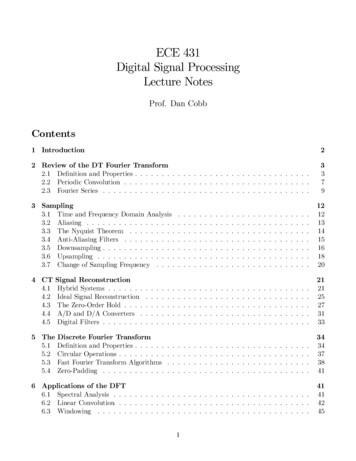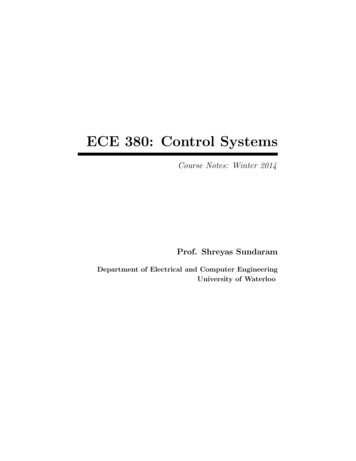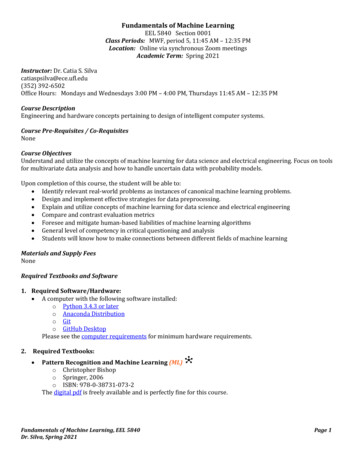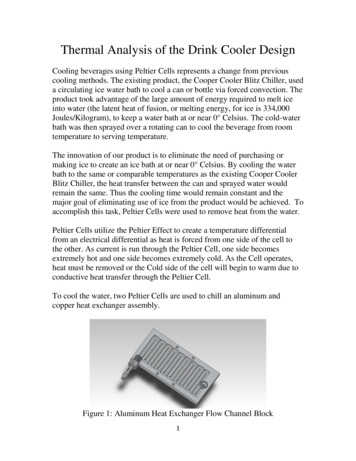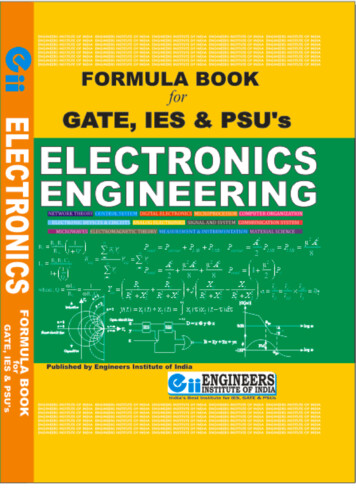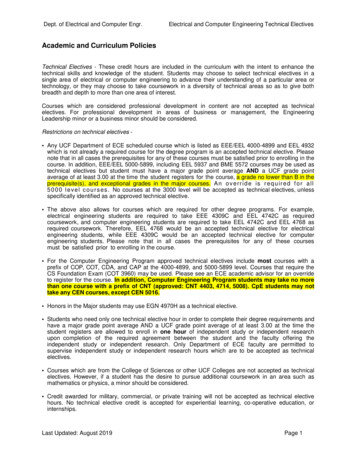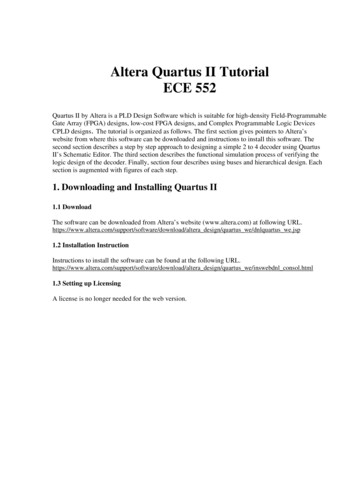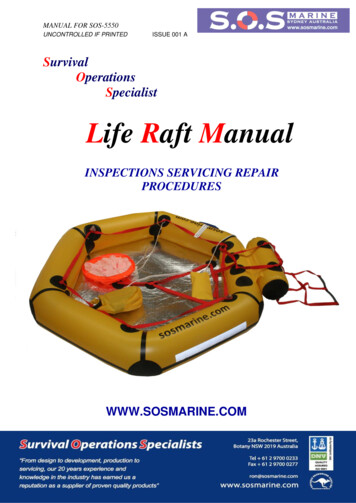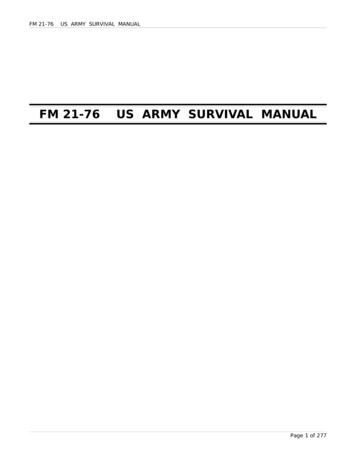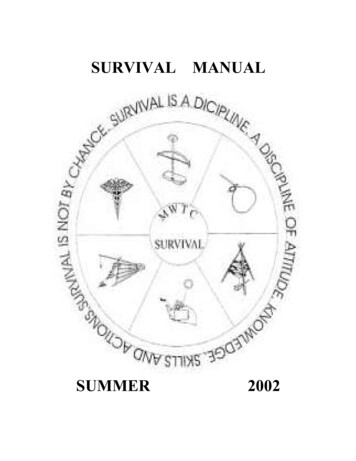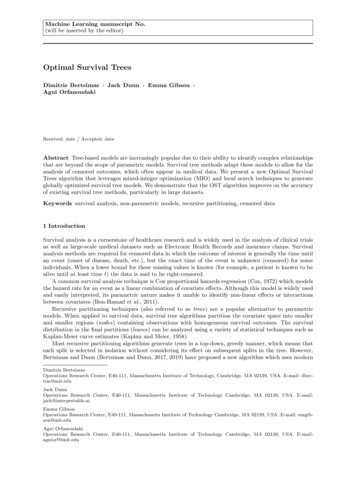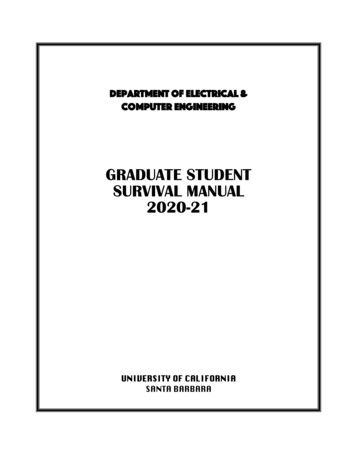
Transcription
DEPARTMENT OF ELECTRICAL &COMPUTER ENGINEERINGGRADUATE STUDENTSURVIVAL MANUAL2020-21UNIVERSITY OF CALIFORNIASANTA BARBARA
TABLE OF CONTENTSI.INTRODUCTION6II.ECE GRADUATE PROGRAMS6III.DEGREE REQUIREMENTS AND PROCEDURES7A.MASTER OF SCIENCEA.1Program AreasA.2M.S. Thesis/M.S. Thesis Committee (Plan I)A.3Comprehensive Examination Requirements (Plan II)A.4Transfer from an M.S.-only to the M.S./Ph.D. Program810161618B.THE DOCTOR OF PHILOSOPHY PROGRAMB.1Ph.D. CommitteeB.2Study PlanB.3Ph.D. Screening ExamB.4Qualifying ExaminationB.5DissertationB.6Time Limit to Earn Doctor of Philosophy Degree/Normative TimeB.7Leaving from the University Before Completion of the Dissertation1820212123242525IV.26COURSE CREDITSC.APPROVAL OF UNDERGRADUATE COURSES FOR GRADUATE CREDIT26D.APPROVAL FOR COURSES OUTSIDE THE DEPARTMENTS OF ECE & CS26E.TRANSFER OF CREDIT26F.INTERCAMPUS EXCHANGE PROGRAM27G."INCOMPLETE" GRADES28V.GENERAL ACADEMIC PROCEDURES28H.REGISTRATION PROCEDURE28I.INTERNSHIP IN INDUSTRY FOR INTERNATIONAL STUDENTS29J.LINGUISTICS REQUIREMENT29K.ATTENDANCE AT COLLOQUIA AND SEMINARS29L.DEPARTMENT POLICY ON PROBATION/DISMISSAL30M.IN-ABSENTIA REGISTRATION301
N.LEAVE OF ABSENCE31O.STUDENT PARTICIPATION IN DEPARTMENTAL AND UNIVERSITY AFFAIRS32P.COMMENCEMENT/DIPLOMA32FINANCIAL MATTERS32VI.Q.FELLOWSHIPS33R.TEACHING ASSISTANTSHIPS33S.P3 STATUS34T.GRADUATE STUDENT RESEARCHER (GSR) POSITIONS34U.TUITION AND FEE FELLOWSHIPS35V.FINANCIAL AID INFORMATION FOR NONIMMIGRANT FOREIGN STUDENTSV.1President's Work-StudyV.2Teaching Assistant Loan, Emergency LoanV.3Part-Time EmploymentW.RESEARCH TRAVEL FUNDS FOR DOCTORAL STUDENTS3535363636X.FILING FEE PAYMENT FOR GRADUATION IN LIEU OF ENROLLMENT36Y.ESTABLISHING CALIFORNIA RESIDENCY372
ECE CONTACT INFORMATIONPERSONNELChair: B. S. ManjunathHarold Frank Hall, Room 4157, x3821Vice Chair: Clint SchowEngineering Science Bldg. (ESB), Room 3205C, X2875Graduate Advisor: Clint SchowEngineering Science Bldg. (ESB), Room 3205C, X2875Student Office: Valerie (Val) de Veyra, Grad. Student MattersBldg. 697, Room 101, x2269. Beth English, Undergraduate MattersBldg. 380, Room 101, x8292. Gayle Gonzales, Graduate AdmissionsBldg. 380, Room 101, x3114.IMPORTANT LOCATIONSRoomPhoneContinuing Students OfficeBldg. 697, Room 101x2269Graduate Admissions OfficeBldg. 380, Room 101x3114Student MailboxesHarold Frank Hall, Room 5154noneFaculty/Staff MailboxesHarold Frank Hall, Room 4164noneECE Dept. Office (Chair)Harold Frank Hall, Room 4157x3821ECE Budget/EmploymentHarold Frank Hall, Room 4115x8748ECE Central Admin. OfficeHarold Frank Hall, Room 4155x3716ECE TA OfficesTrailer 699, Room 103noneRyan Sims, Graduate AcademicCounselorCheadle Hall, Room 3117(e-mail: Ryan.Sims@graddiv.ucsb.edu)x20683
IMPORTANT DATES FOR 2020-21FALL QUARTER 20209/24, ThursdayEnglish Language Placement Exam for new foreign students for whomEnglish is not the native language.9/27, SundayQuarter officially begins.9/28, MondayDepartmental Orientation for Graduate Students, 10:00-11:30 a.m.9/28, MondayECE Departmental T.A. Orientation, 1:00-2:30 p.m.9/29, TuesdayCampus-wide T.A. Orientation, 9:00 a.m. – 1:00 p.m.9/30, WednesdayCampus-wide Orientation for all new Graduate Students, 9 a.m. to 1p.m. & 5-7 p.m.9/30, WednesdayEnvironmental Health & Safety Meeting, 2-5 p.m.10/1, ThursdayInstruction begins.10/1, ThursdayLast day for student to pay all “now due” charges on the September 1BARC statement or to complete financial aid processing. A 50 latepayment fee will be assessed after 4 p.m. on this date.Registration deadline for new and returning students. After this date,new and returning students will be assessed a 50 late registration fee.10/1, Thursday10/7, Wednesday10/8 & 10/9,Thursday &Friday10/14, WednesdayLast day for all students to drop courses without a 3 fee per droptransaction. Last day to add a course w/o an approval code.ECE Ph.D. Screening Exam.10/21, WednesdayLast day to add course without paying 3 fee.Also last day to change grading option without paying 3 fee.Last day to add classes by 11:59 p.m.11/11, WednesdayVeteran’s Day Holiday11/26 & 27,Thursday & Friday12/11, FridayThanksgiving Holiday12/11, FridayLast day of instruction.12/14-18Final exams.12/18, FridayLast day to present theses or dissertations to the Graduate Division toreceive Fall 2020 degree.Last day to submit Incomplete Grade Petitions with the Instructor’ssignature to the Office of the Registrar.Degree candidates must have all transfer course work andexaminations completed no later than this date for current quartergraduation.12/18, Friday12/18, FridayLast day to drop courses or change grading option for the quarter.4
12/18, FridayQuarter ends.12/27, SundayFall 2020 grades available on GOLD.WINTER QUARTER 2021*(Abbreviated schedule, see Winter Schedule of Classes "Calendar" when available.)1/4, MondayQuarter officially begins.1/4, MondayInstruction begins.1/18, MondayMartin Luther King Jr.'s Birthday celebrated (Holiday)2/15, MondayPresident's Day (Holiday)3/2, TuesdayDeadline for continuing, new, & returning students to apply for 2021-22Free Application for Financial Aid (FAFSA).TBADeadline to apply to take ECE Ph.D. Screening Examination.3/12, FridayInstruction ends3/13-19Final exams.3/19, FridayLast day to present theses or dissertations to the Graduate Division toreceive Winter 2021 degree.3/19, FridayDegree candidates must have all transfer course work andexaminations completed no later than this date for current quartergraduation.Quarter ends.3/19, FridaySPRING QUARTER 2021*(Abbreviated schedule, see Spring Schedule of Classes "Calendar" when available.)3/29, MondayQuarter officially begins.3/29, MondayInstruction begins.4/2, FridayECE Ph.D. Screening Examination.5/31, MondayMemorial Day (Holiday)6/4, FridayInstruction ends.6/5-11Final exams.6/11, FridayLast day to present theses or dissertations to the Graduate Division toreceive Spring 2021 degree.6/11, FridayDegree candidates must have all transfer coursework and examinationscompleted no later than this date for current quarter graduation.6/11, FridayQuarter ends.6/11, FridayGraduate Division Commencement.* Information subject to change.5
I.INTRODUCTIONThis Survival Manual is intended as a guide; its purpose is to assist the student in selecting theprogram of study best suited to his/her needs and interests and to furnish help and guidance inthe routine procedures involved in the pursuit of the program. Every effort is made to keep thismanual current, but information is changing constantly. Please contact Val de Veyra in the ECEGraduate Student Office (Building 697, Room 101) with any questions or should you notice anyerroneous information.II.ECE GRADUATE PROGRAMSThe Electrical and Computer Engineering (ECE) graduate program offers Master of Science(M.S.) and Doctor of Philosophy (Ph.D.) degrees, which differ in scope and degreerequirements. The department offers these programs in several topics that fall under threemajor Program Areas: CE, CCSP, and EP;which are summarized in the following table.Computer Engineering (CE)Computer Systems ArchitectureVery Large Scale Integration and ComputerAided DesignSoftware SystemsScientific ComputationComputer Networks and Distributed SystemsComputational Models, Algorithms, andAnalysisGraphics and Image ProcessingMachine IntelligenceCommunications, Control, and Signal Processing (CCSP)Biomedical Signal and Image Processing,Computer Graphics and ComputationalImaging SystemsPhotographyComputer Vision, Pattern Recognition andMachine LearningCyber-Physical Systems, Network Controland Power SystemsDistributed ComputationInformation Theory and Rate Distortion, andMultimedia Data CompressionMulti-Agent Systems, RoboticsSignal Processing Fundamentals andAlgorithmsMulti-Agent Systems, Cooperative Controland Game TheoryNext Generation Wireless CommunicationRobotics and LocomotionNonlinear, Hybrid and Robust ControlScientific and Engineering ComputationAlgorithmsElectronics and Photonics (EP)Compound Semiconductors andWidebandgap Semiconductor TechnologiesQuantum Electronics and NanoscienceElectromagnetics, Optics and AntennasGrowth and Properties of Electronic Materialsand Quantum StructuresRF/Wireless Electronics SystemsRF and Optical Communications6
Integrated Micro-Electro-Mechanical Systems(MEMS) and Micromachining TechnologiesSemiconductor Device PhysicsModern Device and Int. Circuit Processingand FabricationOptical Communication NetworksOpto-Electronic Devices and PhotonicIntegrated CircuitsSolid-State Lighting and DisplaysQuantum Mechanics and Solid-State PhysicsUltra High-Speed Devices and CircuitsAll graduate programs are supervised by the Graduate Council and are administered by theDean of the Graduate Division. At the departmental level, graduate programs are under thedirection of the ECE Department Chair, the ECE Graduate Advisor, and the ECE GraduateAdministration Committee. The Department's Graduate Advisor, who is appointed by the Deanof the Graduate Division on the recommendation of the Department Chair, deals with allgraduate matters affecting the Department and represents the Department in dealings with theGraduate Division.The choice of a program of study is primarily that of the student. Each student is assigned afaculty advisor, whose technical interests coincide with those of the student. The faculty advisoris available for consultation and guidance in course selection and matters related to thestudent's technical program.Each Master’s student must complete and submit to the ECE Graduate Student Office a formalStudy Plan approved by his/her faculty advisor by the end of the his/her graduating quarter.III.DEGREE REQUIREMENTS AND PROCEDURESEach degree has a set of requirements that must be fulfilled for UCSB to grant that degree.Some of these requirements are common to all graduate programs and are imposed by theGraduate Division. The ECE Department is responsible for the remaining requirements, whichvary depending on the Program Area.The degree requirements for the graduate programs listed below are intended to be flexible sothat the program of study can be tailored as much as possible to the needs and interests of thestudent. The student may petition for a variation or waiver of any given requirement. Fordepartmental requirements, the petition may take the form of a letter written to the person orcommittee with appropriate authority, typically the Department's Graduate Advisor. ForGraduate Division requirements, the request should be submitted on a petition form, which canbe downloaded from the following s-petitions.Degree requirements are sometimes altered to accommodate for technical, academic, oradministrative changes. However, students are held to the requirements in effect when theyenter the ECE graduate program unless they have written permission for an exception from theDepartment Graduate Advisor, in the case of departmental requirements, or the Dean of theGraduate Division, in the case of Graduate Division requirements.7
Further information on requirements and procedures may be obtained from the ECE GraduateStudent Office and from the Graduate Division. The student is also expected to read relevantsections of the University's publications: the General ex.aspx) and the Graduate Student MASTER OF SCIENCEECE expects M.S. students to attain the degree in six quarters or less. However, M.S. studentshave up to four years to actually finish the degree. Students who are unable to complete theM.S. in four years must petition the Graduate Council for an extension of degree deadline. TheGraduate Division makes note of all M.S. students who have been granted an extension andconsults with the Department about their progress.Graduate studies leading to the M.S. degree in ECE are administered under either Plan I, whichrequires course work and a thesis; or Plan II, which requires course work and a comprehensiveexamination. Therequirements for obtaining an M.S. degree under each plan are listed below:Graduate Division Requirements (common to both plans)ResidencyGPAFeeThree or more academic quarters in which the student completes 8 unitsor more of course work. All courses (including lower division courses andcourses outside the department) count toward residency.3.0 (B) or more on all courses takenStudent must be registered during the quarter in which the degree isawarded or file a filing fee leave of absence petition and pay a filing fee.ECE Requirements (common to both plans)CoherencyStudy plan approved by the faculty assuring appropriate breadth anddegree of specialization.Besides listing the courses needed to fulfill the major programrequirements (needed for the three program area CE, CCSP, and EP)and the minor program requirements (only CE and CCSP), the StudyPlan must also indicate any work required to meet any deficiency inundergraduate preparation.Course loadEnrolled for a minimum of 12 units per quarter. All courses (includinglower division courses and courses outside the department) count towardthis requirement.How many courses to take in order to meet this requirement depends ona variety of factors, including the extent to which one must work forfinancial support, fluency in English, the quality of preparation, and therelative difficulty of the courses selected. In addition to formal coursework, the following courses may be advisable to meet this requirement: Project and research courses (ECE 596). TAs assisting in ECE courses may register for ECE 502.8
Students studying for the M.S. Comprehensive Exam (Plan I) mayregister for ECE 597. Plan I M.S. students complete their thesis under units of ECE 598. Courses numbered 595 only carry one unit applicable to thisrequirement.Course workComplete at least 42 units of course work.The following courses do not count toward this requirement: Courses graded B- or below. Lower division courses (course number less than 100) ECE or CMPSC upper-division (course number greater than 100 butless than 200) required courses for the undergraduate ElectricalEngineering or Computer Engineering degrees orthose courses that are prerequisites to graduate courses alreadysuccessfully completed. Courses numbered 595, which must be taken for an S/U grade. Courses numbered 597.An Incomplete (I) grade acquired in one quarter must be removed bythe end of the next quarter, or earlier. Otherwise, the "I"automatically becomes an "F" or "U".A student will be allowed to carry No Grades (NG) and No Records (NR)for only one quarter past when the course was originally undertakenbefore the NG or NR automatically reverts to a failing grade. This bringsthe grade notations of NG and NR in line with the policy governingIncomplete grades, except that student will not be able to petition forextensions of NG and NR as they can with an Incomplete.GPA3.0 (B) average in all courses in the 100-, 200- and 500-series, taken asa graduate student with the letter grade option. A student may only signup for 595 and 596 courses with the S/U grading option, which thereforedo not count toward this requirement.Grades received for courses taken outside the Department will becounted in the student's grade-point average, whether or not they areacceptable toward the degree. However, lower division (numbered 1-99)courses do not count towards the GPA calculation.AreaArea Course requirements specific to the student’s program area (CE,CCSP, or EP), as discussed in Section A.1.EMS (English forMultilingualStudents)Linguistics courses passed for those students who were placed in suchcourses as a result of taking the English Language Placement Exam(ELPE). See Section I for details.IncompletesNo Incomplete grades remainingECE requirements specific to Plan I (thesis)9
FormMS Form I filed along with a Conflict of Interest (COI) form.CoursesThe MS Form I used to nominate the thesis committee must also beaccompanied by a Conflict of Interest Form which is available at the ECEGraduate Student Office. Further questions regarding this form may beaddressed by going to the Graduate Division website’s AcademicServices section (www.graddiv.ucsb.edu).8 courses meeting the following requirements: up to a maximum of 12 units from undergraduate level senior electivecourses; up to a maximum of 8 units from ECE 493, 596, independent study orany course taken with the S/U grade option; a minimum of 5 courses in ECE (for CE majors the 5 courses may bein ECE and/or Computer Science); Excluding Engr. 101, ECE 139 & 152A, and all other courses requiredfor the BS in Electrical Engineering and Computer Engineering andTechnology Management (TMP) courses.Thesis8 units of ECE 598 and an approved thesis filed.See Section A.2 for detailed thesis and thesis committee policyinformation.ECE requirements specific to Plan II (comprehensive exam)FormMS Comprehensive Committee form filed.Courses10 courses meeting the following requirements: up to a maximum of 16 units from undergraduate level senior electivecourses; up to a maximum of 8 units from ECE 493, 596, independent study orany course taken with the S/U grade option; a minimum of 7 courses in ECE (for CE majors the 7 courses may bein ECE and/or Computer Science) Excluding Engr. 101, ECE 139 & 152A, and all other courses requiredfor the BS in Electrical Engineering and Computer Engineering and TMPcourses.ExamComprehensive exam passed. An M.S. candidate with serious interest inthe doctoral program may take the Ph.D. Screening Examination in lieuof the M.S. Comprehensive Examination.See Section A.3 for detailed comprehensive exam policy information.A.1Program AreasEach Program Area has specific course requirements for the M.S. degree, which are listedbelow.10
PLEASE NOTE: After taking a particular course, students may not get credit forprerequisites to that course. For example, if ECE 158 is the prerequisite for ECE 258, astudent who has already taken ECE 258 in winter 2021 may not get credit for ECE 158taken the following fall 2021 towards the MS degree requirement.Computer EngineeringThe Computer Engineering M.S. Degree requires a student to take four graduate (200) levelcourses in one of three major areas defined below and two graduate (200) level courses in oneof the remaining seven areas as minor, i.e. other than the chosen major area. No course takenin the major area can be used to fulfill the minor requirement, and vice versa, even if the courseis listed in more than one area.The major must be taken in one of these three areas: a) Very Large Scale Integration andComputer Aided Design; b) Computer Networks and Distributed Systems, or c) ComputerArchitecture.Very Large Scale Integration andComputer Aided DesignECE 220A Semiconductor DeviceProcessingComputer Networks and DistributedSystemsECE 250Wireless Communication andNetworkingECE 223High-Performance DigitalCircuit DesignECE 251Mobile Embedded SystemsECE 224AVLSI Project DesignCS 270Operating SystemsECE 225High Speed Digital IntegratedCircuit DesignCS 271Advanced Topics in DistributedSystemsECE254DAdvanced ComputerArchitecture: MemoryCentric ComputingAdvanced VLSI Architectureand DesignCS 276Advanced Topics in NetworkingCS 279Network Security and IntrusionDetectionECE 272AMachine Learning in Designand Test AutomationCS 284Mobile ComputingECE 272BArtificial Intelligence in Designand Test AutomationECE256CComputer ArchitectureMachine IntelligenceECE 251Mobile Embedded SystemsCS 266Formal Specification andVerificationECE 252BComputer ArithmeticCS 267Automated VerificationECE 253Embedded Systems DesignCS/ECE281Advanced Topics in ComputerVision11
ECE 254AAdvanced ComputerArchitecture: Processor DesignECE 278ADigital Image ProcessingECE 254BECE 283Machine Learning: A SignalProcessing PerspectiveECE 257AAdvanced ComputerArchitecture: ParallelProcessingAdvanced ComputerArchitecture: Memory-CentricCom
1 TABLE OF CONTENTS I. INTRODUCTION 6 II. ECE GRADUATE PROGRAMS 6 III. DEGREE REQUIREMENTS AND PROCEDURES 7 A. MASTER OF SCIENCE 8 A.1 Program Areas 10 A.2 M.S. Thesis/M.S. Thesis Committee (Plan I) 16 A.3 Comprehensive Examination Requirements (Plan II) 16 A.4 Transfer from an M.S.-only t
